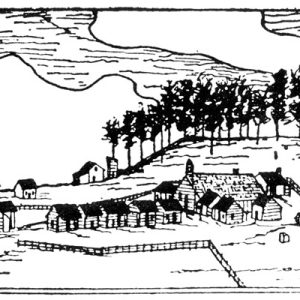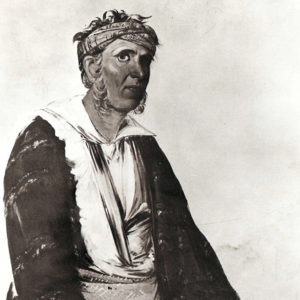calsfoundation@cals.org
John Jolly (?–1838)
aka: Ah ludi ski
aka: Ooluntuskee
John Jolly, president of the Arkansas Cherokee, was a key figure in Cherokee affairs during and after their residence along the Arkansas River in west-central Arkansas. Born in Tennessee into an influential mixed-race family, he had a successful trading post on Hiwassee Island in eastern Tennessee, at the confluence of the Hiwassee River and the Tennessee River.
Jolly’s brother Tahlonteskee was one of several Cherokee chiefs who voluntarily moved a group of Cherokee from their lands into the area that would become Arkansas shortly after the Louisiana Purchase in 1803. Following an 1817 treaty that promised an exchange of their lands east of the Mississippi River for an equivalent area in Arkansas, Tolontuskee and his followers moved gradually from northeast Arkansas into central Arkansas, settling along the Arkansas River between Point Remove Creek and the mouth of the Poteau River. Jolly joined his brother in 1818.
By 1818, Jolly and his family, along with some neighbors, had relocated to the Spadra area (Johnson County).
The 1817 treaty gave the Cherokee the opportunity to have a specific piece of territory assigned to them, although in reality the details of Cherokee rights to this land were not spelled out in detail. The Cherokee Reservation included most of northwest Arkansas north of the Arkansas River and west of a line that ran northeast from the mouth of Point Remove Creek to the south bank of White River.
Jolly’s homestead became a well-known, prosperous enterprise. His double-pen log house was situated amid a network of fields, peach orchards, and animal husbandry facilities. Among his visitors was Thomas Nuttall, the well-known naturalist. The missionary Cephas Washburn depended on Jolly’s support of education for Cherokee children for the success of Dwight Mission, which was situated near Jolly’s home near Spadra Creek, and Indian agents and other government bureaucrats wrote to him frequently.
Jolly was described as an affable, low-key person who dressed in the Western manner. He supported efforts to equip Cherokee with knowledge and technology that would help them sustain their communities and deal successfully with American government authorities. He likely understood English himself, being a businessman and a spokesperson for his people for much of his life; in addition, he probably also understood French and more than one tribal language.
Jolly became the principal civil chief—a leadership position that dealt with civil affairs within the Cherokee settlements and diplomatic affairs outside them—of the Arkansas Cherokee shortly after his arrival when his brother Tolontuskee died in the spring of 1819. He was a leader of domestic affairs within the Cherokee communities and a spokesperson on behalf of the Arkansas Cherokee to U.S. government officials. In 1824, the Cherokee Council reorganized the tribal government for the Arkansas Cherokee, and Jolly was chosen president by general consensus.
In his role as leader, Jolly frequently raised issues of security and treaty rights with both U.S. government officials in Washington DC and with Arkansas territorial authorities. Shortly after being named president, Jolly wrote to Arkansas governor George Izard in alarm over rumors that the governor was about to broach the subject of the sale of Cherokee lands in Arkansas. Jolly advised the governor that the Cherokee had no lands whatsoever that they wished to sell and that, furthermore, the U.S. government was in arrears in meeting its financial obligations left over from the previous treaty of 1817. For a decade, he used diplomatic means to fend off pressures from American settlers and government representatives to restrict Cherokee lands in Arkansas and eventually to force the Arkansas Cherokee to move again out of Arkansas and into Indian Territory.
In 1828, the Arkansas Cherokee reluctantly agreed to give up their land and farms in Arkansas and move west into what is now Oklahoma. Jolly settled at the confluence of the Illinois and Arkansas rivers, where he established a new plantation. He remained an influential leader until his death in December 1838, near what is now Webbers Falls, Oklahoma.
For additional information:
Bolton, S. Charles. Arkansas, 1800–1860: Remote and Restless. Fayetteville: University of Arkansas Press, 1998.
Hoig, Stanley. The Cherokees and Their Chiefs. Fayetteville: University of Arkansas Press, 1998
Washburn, Cephas. Reminiscences of the Indians. Edited by Hugh Park. Van Buren, AR: Press Argus. 1955
Ann M. Early
Arkansas Archeological Survey
 Dwight Mission
Dwight Mission  John Jolly
John Jolly 




John Jolly served as a surrogate father for young Sam Houston beginning in 1809, and they both fought at the Battle of Horseshoe Bend in 1814. Fifteen years later after Houston resigned as governor of Tennessee, Jolly welcomed Houston to the Cherokee Nation and arranged for him to become a Cherokee citizen. (Chronology of Sam Houston’s Life, Sam Houston Memorial Museum via http://samhoustonmemorialmuseum.com/history/, viewed November 17, 2022))